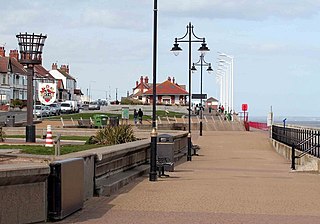
Hornsea is a seaside town and civil parish in the East Riding of Yorkshire, England. The settlement dates to at least the early medieval period. The town was expanded in the Victorian era with the coming of the Hull and Hornsea Railway in 1864. In the First World War the Mere was briefly the site of RNAS Hornsea Mere, a seaplane base. During the Second World War the town and beach was heavily fortified against invasion.

Horbury is a town in the City of Wakefield in West Yorkshire, England. Historically in the West Riding of Yorkshire, it is situated north of the River Calder about three miles (5 km) south west of Wakefield and two miles (3 km) to the south of Ossett. It includes the outlying areas of Horbury Bridge and Horbury Junction. At the 2001 census the Horbury and South Ossett ward of Wakefield Metropolitan District Council had a population of 10,002. At the 2011 census the population was 15,032. Old industries include woollens, engineering and building wagons for the railways. Horbury forms part of the Heavy Woollen District.
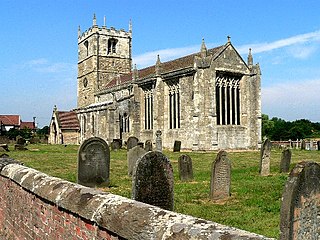
Skipwith is a village and civil parish about 4 miles (6.4 km) north-east of Selby and 10 miles (16 km) south-east of York in North Yorkshire, England. It was historically in the East Riding of Yorkshire. After the 1974 local government reorganisation Skipwith was in the Selby District of the shire county of North Yorkshire. In 2023 the district was abolished and North Yorkshire became a unitary authority.
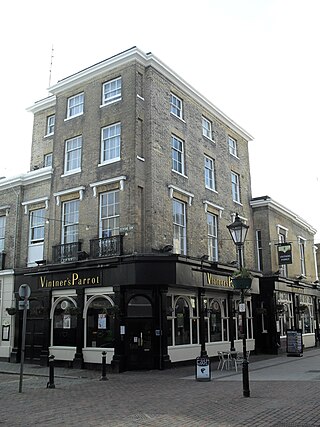
The Thieves' Kitchen is a pub in the centre of the town and borough of Worthing, West Sussex. Established as a public house in the late 20th century, it occupies two early 19th-century listed buildings in the oldest part of the town: a Greek Revival-style former wine merchants premises, and a Neoclassical chapel built for Wesleyan Methodists in 1839. The main part of the pub is in the wine merchants building facing Warwick Street, while the old chapel, facing Bedford Row, serves as its function room. Both buildings have been designated separately as Grade II Listed Buildings.
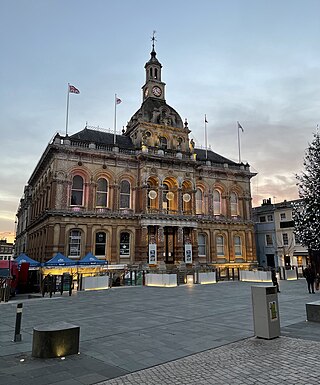
Bellamy and Hardy was an architectural practice in Lincoln, England, that specialised particularly in the design of public buildings and non-conformist chapels. Pearson Bellamy had established his own architectural practice by 1845 and he entered into a partnership with James Spence Hardy in June 1853. Both partners had previously worked for the Lincoln architect William Adams Nicholson. Hardy was described as "Chief Clerk" to Nicholson. Hardy joined Pearson Bellamy immediately after the sudden death of Nicholson. As all known architectural drawings by the practice are signed Pearson Bellamy, it is likely that Bellamy was the architect and Hardy was the administrator in the practice. The partnership lasted until 1887. Bellamy continued to practise until 1896.
Alfred Hill Thompson, ARIBA was an English architect in the Gothic Revival and Arts and Crafts styles, who specialised in small schools and chapels in the Yorkshire area. In partnership with Isaac Thomas Shutt he co-designed the Church of All Saints, Harlow Hill, completed in 1871.

County Hall is a municipal building in Cross Street, Beverley, East Riding of Yorkshire, England. County Hall, which is the headquarters of East Riding of Yorkshire Council, is a Grade II listed building.

Bridlington Town Hall is a municipal building in Quay Road, Bridlington, East Riding of Yorkshire, England. The town hall, which was the meeting place of Bridlington Borough Council, is a Grade II listed building. It now serves as an area office of East Riding of Yorkshire Council.

Elland Town Hall is a municipal building in Southgate, Elland, West Yorkshire, England. The structure, which was primarily used as an events venue, is a Grade II listed building.
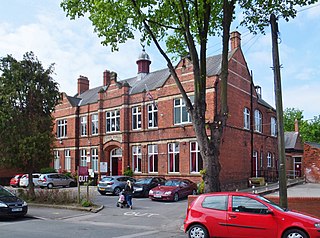
Hessle Town Hall is a municipal building in South Lane, Hessle, East Riding of Yorkshire, England. It is the meeting place of Hessle Town Council.

Otley Civic Centre is a municipal structure in Cross Green, Otley, West Yorkshire, England. The structure, which was the offices and meeting place of Otley Town Council, is a Grade II listed building.

Cockermouth Town Hall is a municipal structure in Market Street, Cockermouth, Cumbria, England. The structure, which is the meeting place of Cockermouth Town Council, is a Grade II listed building.

South Cave Town Hall is a municipal building in the Market Place, South Cave, East Riding of Yorkshire, England. The building, which is the meeting place of South Cave Parish Council, is a Grade II listed building.

Hedon Town Hall is a municipal building in St Augustine's Gate, Hedon, East Riding of Yorkshire, England. The building, which is the meeting place of Hedon Town Council, is a Grade II* listed building.
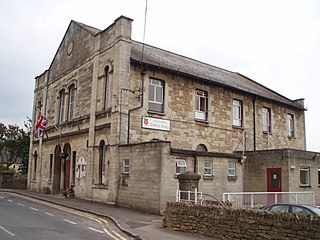
Nailsworth Town Hall is a municipal building in Old Bristol Road in Nailsworth, Gloucestershire, England. The structure currently operates as the meeting place of Nailsworth Town Council as well as a community events venue.
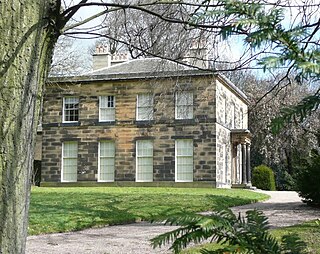
Kirkburton Hall, formerly known as Kirkburton Town Hall, and before that, as Springfield House, is a former municipal building in Penistone Road in Kirkburton, a town in West Yorkshire in England. The building, which was previously the offices and meeting place of the Kirkburton Urban District Council and is now a private residence, is a grade II listed building.

Bentham Town Hall, also known as High Bentham Town Hall, is a municipal building in Station Road, High Bentham, a town in North Yorkshire, England. The building currently accommodates Bentham Town Council but is also used as a community events venue and a tourist information office.

Ivybridge Town Hall is a municipal building at Erme Court in Ivybridge, a town in Devon, in England. It serves as the meeting place of Ivybridge Town Council.

Bodmin Guildhall is a historic building in Fore Street in Bodmin, a town in Cornwall, in England. The structure, which was used for municipal purposes before being converted for use as a baker's shop and restaurant, is a Grade II listed building.




















